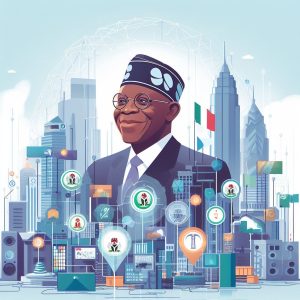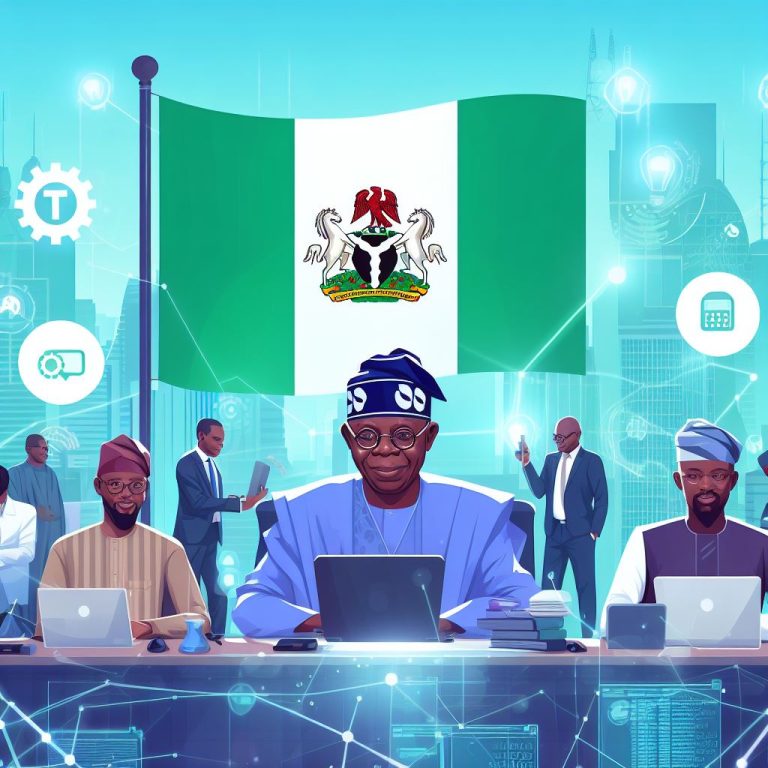Nigeria is a nation on the move. A nation that is embracing the power of technology to reshape its destiny. A nation that is witnessing a digital revolution that is transforming every aspect of its society. A nation that is being led by a visionary leader who understands the importance of technology for the future of Nigeria.
That leader is President Bola Ahmed Tinubu, who took office in 2023 with a clear mandate to accelerate Nigeria’s digital transformation. Since then, he has implemented a series of policies and programs that have enhanced the digital landscape in Nigeria, creating a conducive environment for innovation, growth, and inclusion. In this opinion column, I will highlight some of the key initiatives undertaken by the Tinubu Administration in four critical sectors: fintech, agriculture, education, and technology.
Fintech: The Financial Sector’s Game-Changer
One of the most visible impacts of digital transformation in Nigeria can be seen in the financial sector. Fintech companies have emerged as the game-changers, offering innovative financial services to the unbanked and underbanked population. Mobile banking, digital payment solutions, and peer-to-peer lending platforms have fundamentally changed how Nigerians manage their finances. This digital revolution has not only boosted financial inclusion but has also contributed to economic growth and poverty reduction.
President Tinubu has shown a strong support for the fintech sector, recognizing its potential to drive Nigeria’s development. He has introduced policies that foster collaboration between traditional financial institutions and fintech startups, creating a win-win situation for both parties. He has also established regulatory sandboxes that allow fintech companies to test their products and services in a controlled environment, without compromising the security and efficiency of financial transactions. Moreover, he has promoted the use of digital identity systems, such as the National Identification Number (NIN), to facilitate the verification and authentication of customers and transactions.
Agriculture: Cultivating Growth through Technology
Agriculture, the backbone of Nigeria’s economy, has also undergone a remarkable transformation through technology. From precision farming to e-commerce platforms linking farmers with buyers, technology has brought efficiency and transparency to the sector. Access to real-time weather information, mobile apps for crop management, and digital marketplaces have empowered farmers, increasing productivity and food security.
President Tinubu has demonstrated a keen interest in improving the agricultural sector through technology. He has partnered with technology companies, such as Microsoft and Google, to provide farmers with access to digital tools and techniques that can enhance their farming practices. He has also invested in rural broadband infrastructure, ensuring that even remote areas have access to the benefits of digital agriculture. Furthermore, he has launched initiatives, such as the Green Imperative Program, to provide farmers with mechanization and irrigation facilities, as well as training and extension services.
Education: Bridging the Knowledge Gap
Digital transformation has also revolutionized Nigeria’s education sector, bridging the knowledge gap and providing access to quality education for all. E-learning platforms, online courses, and virtual classrooms have made education more accessible, especially for those in remote areas. Technology has created new opportunities for lifelong learning, skill development, and professional growth.
President Tinubu has placed a strong emphasis on enhancing digital education in Nigeria. He has worked with educational technology providers, such as Coursera and Udemy, to equip schools with the necessary digital infrastructure and resources. He has also initiated programs, such as the Digital Literacy and Skills Program, to train teachers in digital pedagogy and develop digital content for the curriculum. Additionally, he has supported the establishment of innovation hubs and centers of excellence, such as the African University of Science and Technology, to foster research and development in science and technology.
Technology: Building a Digital Workforce
Technology, as a sector in itself, has witnessed tremendous growth and development in Nigeria. The country has become a hub of innovation, producing world-class tech startups and solutions. From e-commerce to ride-hailing, social media to gaming, Nigerian tech entrepreneurs have made their mark on the global stage. Technology has also created new employment opportunities, especially for the youth, who constitute the majority of the population.
President Tinubu has shown a strong commitment to supporting and enhancing the tech sector in Nigeria. One of his flagship initiatives is the 3 Million Technical Talent (3MTT) program, which aims to train and place 3 million Nigerians in technical skills, such as software development, data science, cybersecurity, and cloud computing by 2025. The program, executed in collaboration with NITDA, will generate a pipeline of technical talent that will power Nigeria’s digital economy and position the country as a net talent exporter. President Tinubu has also introduced other policies and programs to foster the tech sector, such as streamlining regulatory processes, investing in digital infrastructure, promoting digital skills and education, and fostering collaborations with international partners .
Nigeria is a nation that is undergoing a digital transformation that is reshaping its future. A nation that is being led by a leader who has a vision and a plan to make Nigeria a digital powerhouse. A nation that is poised to become a role model for other African countries and the world. President Bola Ahmed Tinubu is the leader that Nigeria needs to achieve its digital aspirations. He is the leader that is leading Nigeria’s digital transformation.

